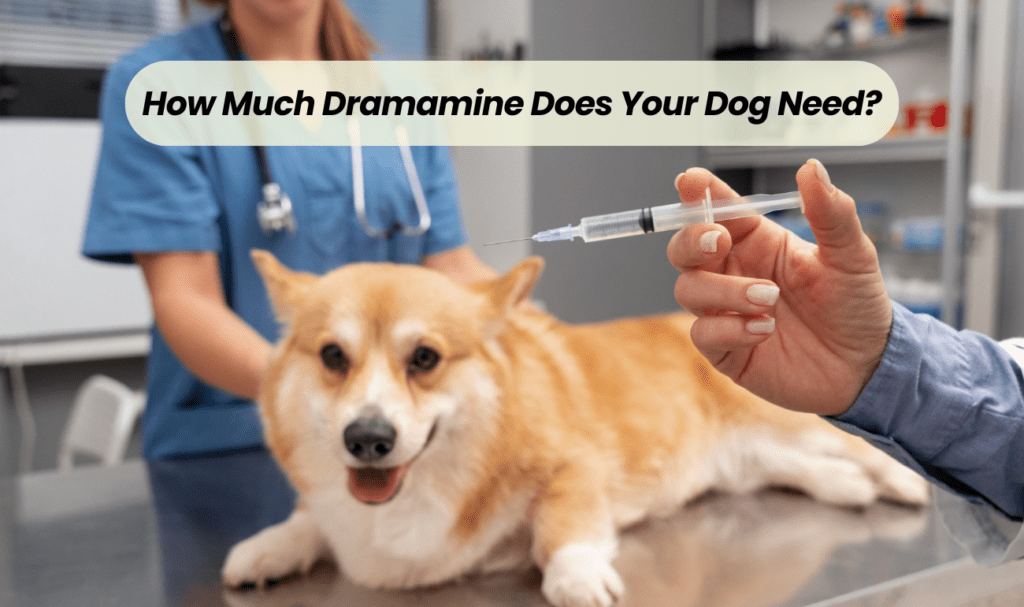If you’re a dog owner who loves to travel or has a pup that experiences motion sickness, you may have wondered about the use of Dramamine for dogs. Dramamine, a common over-the-counter medication used to treat motion sickness in humans, can also be used for our furry friends. However, it’s essential to understand the purpose and dosage of Dramamine for dogs to ensure their comfort and safety during travel.
- Understanding the purpose of Dramamine for dogs
- Factors to consider when determining the dosage of Dramamine for dogs
- Recommended dosage of Dramamine for dogs based on weight
- Common side effects of Dramamine in dogs
- Precautions and safety measures when giving Dramamine to dogs
- Alternative remedies for motion sickness in dogs
- Consulting with a veterinarian for proper dosage and administration of Dramamine
- Frequently asked questions about giving Dramamine to dogs
- Conclusion: Ensuring your dog’s comfort and safety during travel
Understanding the purpose of Dramamine for dogs
Dramamine, also known as dimenhydrinate, is an antihistamine drug that helps alleviate nausea, vomiting, and dizziness caused by motion sickness. It works by blocking certain signals in the brain that trigger the symptoms of motion sickness. While it is primarily used for humans, it can also be prescribed by veterinarians to treat motion sickness in dogs.
Motion sickness can be a common issue for dogs, especially during car rides or when traveling by boat or plane. Symptoms of motion sickness in dogs may include excessive drooling, panting, vomiting, restlessness, and uneasiness. Dramamine can help alleviate these symptoms and make your dog’s travel experience much more comfortable.
Factors to consider when determining the dosage of Dramamine for dogs
Before administering Dramamine to your dog, there are several factors to consider to determine the appropriate dosage. The dosage may vary depending on your dog’s weight, age, overall health, and the severity of their motion sickness. It’s crucial to consult with a veterinarian who can provide personalized guidance.
Additionally, you should never give your dog Dramamine without a veterinarian’s approval. Some dogs may have medical conditions or be on medications that can interact negatively with Dramamine. A professional opinion will ensure your dog’s safety and well-being.
Recommended dosage of Dramamine for dogs based on weight
The recommended dosage of Dramamine for dogs is typically based on their weight. The general guideline is to administer 4 milligrams of Dramamine per kilogram of body weight, but it’s essential to consult with your veterinarian for accurate dosing instructions. They will consider your dog’s specific needs and provide you with the correct dosage.
For example, if your dog weighs 10 kilograms, the recommended dosage would be 40 milligrams of Dramamine. However, it’s essential to note that Dramamine tablets usually come in 50-milligram doses. In this case, you would need to break the tablet into smaller pieces or ask your veterinarian about alternative forms of Dramamine that are available.
Common side effects of Dramamine in dogs
While Dramamine can be effective in treating motion sickness in dogs, it’s essential to be aware of potential side effects. Dogs may experience drowsiness, dry mouth, and urinary retention when taking Dramamine. These side effects are usually mild, but if you notice any severe reactions or changes in your dog’s behavior, it’s important to contact your veterinarian immediately.
Additionally, Dramamine should not be used for dogs with glaucoma, prostate problems, urinary obstruction, heart conditions, or seizures. Always disclose your dog’s medical history and any existing health conditions to your veterinarian before administering Dramamine.
Also Read: How fast the dog can go in woods
Precautions and safety measures when giving Dramamine to dogs
To ensure your dog’s safety when giving them Dramamine, there are a few precautions and safety measures to keep in mind. Firstly, never exceed the recommended dosage provided by your veterinarian. Giving your dog too much Dramamine can lead to overdose symptoms such as excessive sedation, disorientation, or even seizures.
It’s also crucial to monitor your dog closely after administering Dramamine. If you notice any severe side effects or unusual behavior, contact your veterinarian immediately. Keep in mind that Dramamine may take some time to take effect, so plan your dog’s travel accordingly.
Lastly, always store Dramamine in a safe place, away from your dog’s reach. Accidental ingestion of Dramamine by your dog can lead to serious complications. If you suspect your dog has ingested Dramamine without your knowledge, seek veterinary assistance immediately.
Alternative remedies for motion sickness in dogs
While Dramamine is an effective treatment for motion sickness in dogs, there are also alternative remedies you can consider. Natural remedies such as ginger, peppermint, or chamomile can help alleviate nausea and soothe your dog’s stomach. These remedies are generally safe for dogs, but it’s always best to consult with your veterinarian before trying them.
Additionally, there are specialized dog vests or wraps available that apply gentle pressure to specific acupressure points, which can help reduce motion sickness. These vests work similarly to how acupuncture or acupressure techniques work for humans. They are worth exploring as a non-medication option for managing your dog’s motion sickness.
Consulting with a veterinarian for proper dosage and administration of Dramamine
Before administering Dramamine to your dog, it’s crucial to consult with a veterinarian. They will assess your dog’s health, weight, and specific needs to determine the appropriate dosage and administration method. Your veterinarian may also recommend alternative treatments or provide additional advice to ensure your dog’s comfort and safety during travel.
Remember, your veterinarian is the best resource when it comes to your dog’s health. They have the knowledge and expertise to guide you through the process and address any concerns you may have. By working together, you can provide your furry friend with the best care possible.
Frequently asked questions about giving Dramamine to dogs
- Can I give my dog human Dramamine? It is not recommended to give your dog human Dramamine without consulting with a veterinarian. Human medications may contain ingredients that are harmful to dogs, and the dosage may not be appropriate for their weight and needs.
- Can I give my dog Dramamine for long car rides? Yes, Dramamine can be used for long car rides to help alleviate motion sickness in dogs. However, always consult with a veterinarian to determine the proper dosage and administration method.
- Can I give my puppy Dramamine? It is generally not recommended to give Dramamine to puppies without veterinary guidance. Puppies have different needs and may be more sensitive to medications.
- Are there any alternatives to Dramamine for dogs? Yes, there are alternative remedies such as natural herbs or specialized dog vests that can help manage motion sickness in dogs. Consult with a veterinarian to explore these options.
Conclusion: Ensuring your dog’s comfort and safety during travel
When it comes to your furry friend’s well-being during travel, understanding the purpose and dosage of Dramamine for dogs is crucial. By consulting with a veterinarian and following their guidance, you can provide your dog with the appropriate dosage of Dramamine to alleviate motion sickness and ensure their comfort and safety.
Remember to consider factors such as your dog’s weight, age, and health condition when determining the dosage. Monitor your dog closely for any side effects and seek veterinary assistance if needed. And if Dramamine isn’t the right fit for your dog, explore alternative remedies or specialized dog vests that can help manage motion sickness.
By prioritizing your dog’s comfort and safety, you can make every travel experience a more enjoyable one for both you and your furry friend.
Click here to find more information and resources about caring for your dog’s health and well-being during travel.

